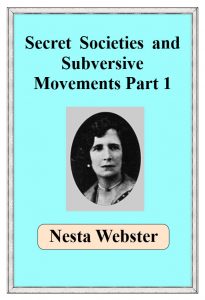“ There is in Italy a power which we seldom mention in this House . . . I mean the secret societies. . . . It is useless to deny, because it is impossible to conceal, that a great part of Europe—the whole of Italy and France and a great portion of Germany, to say nothing of other countries—is covered with a network of those secret societies, just as the superficies of the earth is now being covered with railroads. And what are their objects ? They do not attempt to conceal them. They do not want constitutional government: they do not want ameliorated institutions . . . they want to change the tenure of land, to drive out the present owners of the soil and to put an end to ecclesiastical establishments. Some of them may go further. . .” (DISRAELI in the House of Commons, July 14, 1856.)
IT IS A MATTER OF SOME REGRET to me that I have been so far unable to continue the series of studies on the French Revolution of which The Chevalier de Boufflers and The French Revolution, a Study in Democracy formed the first two volumes. But the state of the world at the end of the Great War seemed to demand an enquiry into the present phase of the revolutionary movement, hence my attempt to follow its course up to modern times in World Revolution. And now before returning to that first cataclysm I have felt impelled to devote one more book to the Revolution as a whole by going this time further back into the past and attempting to trace its origins from the first century of the Christian era. For it is only by taking a general survey of the movement that it is possible to understand the causes of any particular phase of its existence. The French Revolution did not arise merely out of conditions or ideas peculiar to the eighteenth century, nor the Bolshevist Revolution out of political and social conditions in Russia or the teaching of Karl Marx. Both these explosions were produced by forces which, making use of popular suffering and discontent, had long been gathering strength for an onslaught not only on Christianity, but on all social and moral order.
